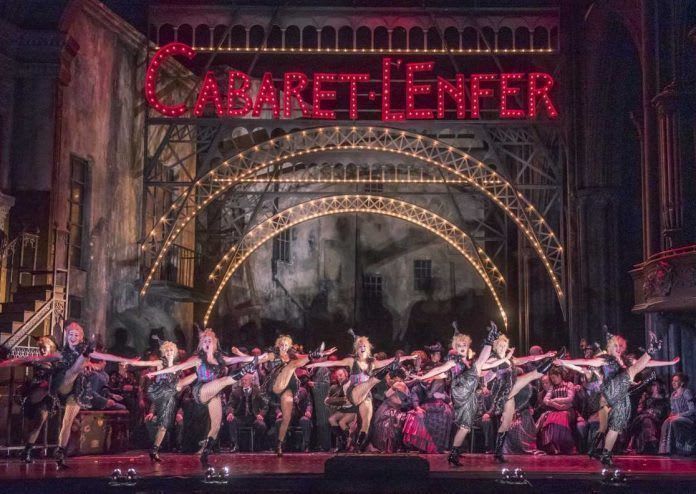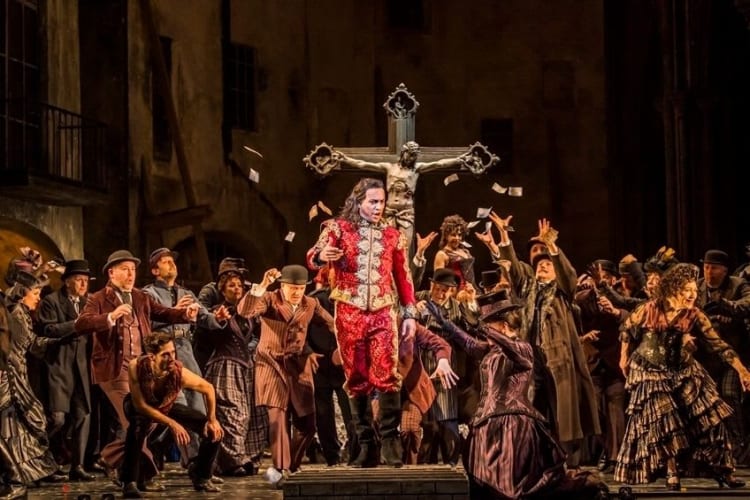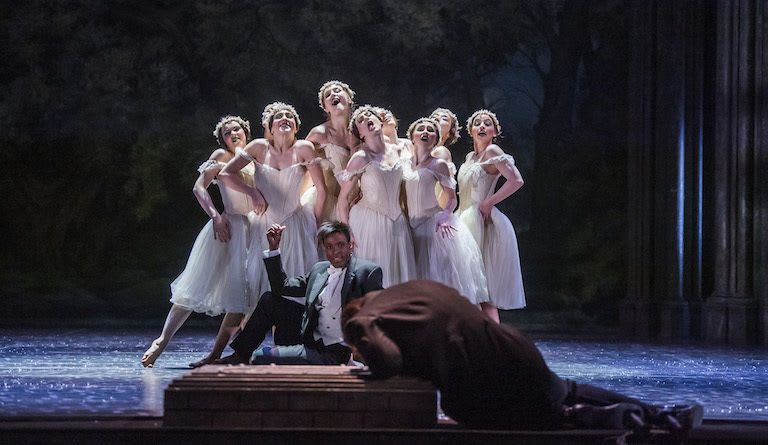We might no longer share that religious dualism of heaven and hell, that choice between redemption or damnation that possessed the mind of the mediaeval Dr Faustus, but Gounod’s horror-show of an opera continues to hold its fascination.
For this is the fifth revival of David McVicar’s momentous 2004 production which unites the forces of good and evil within each character and every scene. It’s the fusion of opposites that gives the show its dynamism and makes its players real people, not mere philosophical signifiers.
A theatre box flanking the stage faces a church organ loft, Erwin Schrott’s Méphistophélès poses as a holy statue, the soldiers’ chorus celebrating ‘immortal glory’ is sung by a defeated army of the wounded and crippled, the set of a crucifixion scene becomes an infernal night club, and a heavily pregnant dancer is painfully flung around amid a troupe of lily-white ballerinas.
Faust (Michael Fabiano), disillusioned with life, sells his soul to the devil to regain his youth, whereupon he seduces and abandons Marguerite (Irina Lungu) and her baby. Even as she finally ascends to heaven, a top-hatted C19 angel seems to cut an ironic figure, while the devil laughs in a win-some, lose-some sort of way.
The orchestra, sympathetically directed by Dan Ettinger, is in on the act too. A favourite moment comes as Faust is courting Marguerite with sweet assertions of love. But over his seemingly sincere words comes an exaggeratedly schmaltzy commentary on the first violin that seems to say ‘Oh yeah?’
Schrott plays a devil amused by his own importunity, a malign, sword-stick swirling charmer with rolling eyes, and five variations of mocking laughter, more insidiously untrustworthy, less overtly frightening than Bryn Terfel’s baddie in the original production.
That had a dream cast with Roberto Alagna and Angela Gheorghiu, and if the latest lot don’t quite match those magical voices, they do pretty well. Schrott has powerful, slurry bass that fits well with the bright, steely tenor of Fabiano, from whom there is just a jarring top note sung in head voice.
The technically excellent recording was made over two performances in April 2019, the first of them one week after Mandy Fredrich had famously arrived in London two hours before curtain-up to stand-in as Marguerite for Irina Lungu who had a throat infection. Lungu seemed to have fully recovered—the voice has depth and agility, displayed in Marguerite’s folksy tune and the jewel song that follows it, although there could have been greater differentiation in their manner of delivery. I preferred her in the short lyrical pieces, such as the lament for her dead sister, sung with beautiful, heart-rending diminuendi.
Other principals are first class: baritone Stéphane Degout as Marguerite‘s hide-bound brother Valentin appears briefly but long enough to shine as lustrously as any voice on stage; Marta Fontanals-Simmons sings the heart out of a limited role as the heroine’s suitor; and mezzo Carole Wilson does what she’s asked to do as Méphistophélès's would-be mistress, resembling a randy Angela Merkel.
There are some raunchy ballets along the way, demonstrating that if the devil does not always have the best tunes, he does have the most raucous dances.
Extra tracks on the DVD explore the character of Méphistophélès and comment on the production. The accompanying booklet includes a synopsis, but annoyingly there are no timings for the tracks, artist biographies, or further analysis, instead of which there is an irrelevant history of references to the opera in The Phantom of the Opera, Edith Wharton’s The Age of Innocence, and at greater length in Hergé’s Adventures of Tintin! Not what I felt most buyers wanted to know.
Running time: 178 minutes.


